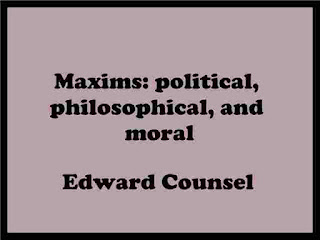Download Maxims: political, philosophical, and moral- PDF book by Edward Counsel
Maxims: political, philosophical, and moral
In submitting to the public the Second augmented Edition of the Maxims, the author deems it necessary to offer some introductory remarks, so as to arrive at a proper understanding of his motives in publishing the present unpretentious volume. Besides the original edition of this work (which only comprised some 3,200 Maxims — embodied, however, in the present issue), I have published two Musical Works, viz., "Melodies of Erin" (twelve songs), and also a Song with pianoforte accompaniments. Particulars of these — as also my other productions — may be consulted in the
Appendix. For the above-mentioned works I have been favoured by letters of approval — accepting the books and placing them permanently in their libraries— from several of the leading Universities of Europe and America, amongst which may be mentioned the world-famed Military College of West Point, Oxford, Cambridge (report), Dublin, Louvain, Bonn, Jena, Heidelberg, Gottingen, California, Sydney, etc. For the " Melodies," and in some cases the Maxims (first edition), the Municipalities of Paris, Seville, New York, Philadelphia, Manchester, and others; the National Library of Madrid, British Museum, Connecticut State Legislature, Parliaments of Victoria and South Australia, University Libraries of Ghent, Utrecht, Lund, Upsala, and other prominent public bodies. Copies of these letters (selected from a considerable number received) will be found in the Addenda of Public Correspondence at the end of the volume.
They embrace letters in Spanish, French, Italian, German, Dutch, Swedish, and Latin. They have not been translated, but are presented in the original languages. I have composed, probably, more Original Airs, and other varieties in the way of music, than any other musical writer in the world — exceeding in number twenty thousand (20,000). For a list of the different varieties vide Appendix In my theory of a "Universal Melodic Composing (Themal) Faculty" — which will be cursorily glanced at in another portion of this work — from investigations I have made, supported, too, by some undoubted proofs — I have come to the astounding conclusion that all human beings, without exception, possess the germs of a creative original melodic composing faculty; I have even formulated some theories on the subject, and read a lecture unfolding my discoveries.
I am prepared to admit, however, that in the majority of instances the faculty may be dormant or latent: simply for the want of being exercised — a philosophy certainly very flattering to human nature. Perhaps I may be afforded an opportunity of reproducing my lecture upon this interesting art subject with practical examples.
To return more particularly to the subject matter of the present volume. Maxims exert no small influence upon our lives and faculties. They are inward monitors directing the motives and actions to be pursued in every imaginable undertaking, not only of individuals but of nations. Unvoiced Maxims have ruled, and must ever continue to rule, the destinies of all nations. Their influence lasts through all time. Philosophy (first acquired, probably, by the knowledge of human errors), like Nature, is ever-renewing her strength.
It is the common possession of all — common as the blood that supports the air we breathe — universal as are our perceptions and faculties; and, if we but reasoned justly, we would discover at the close of our investigations that all men are originally created on a dead-level of intellect.
There are degrees of cause and effect. One produces many, but each man can contribute infinitely. If there are grave mysteries in nature not to be unfolded — yet, why repine, my friends? What we are already possessed of — if we but exercise the faculty — may be termed an infinite possession. Some of the following Maxims or reflections are essentially speculative; and, consequently, have not arrived at the dignity of settled opinions.
Let this fact be distinctly understood in the examen, or discussion of the propositions. I do not hold myself responsible for the misapplication of any of my theories. If some of the Maxims have a political bearing, nothing of a revolutionary tendency is attempted to be propounded; moreover, the author being a Roman Catholic, every proposition is necessarily advanced in accordance with, and subject to, the great principles of Catholicity.
Some of the ideas and positions here attempted to be advanced contain— if we look under the surface with a just and liberal inter- pretation — the germs, I think, of new philosophic principles, for under every idea lies a philosophy, leading, each in turn, to an infinitude of systems. Yet, should they, be considered merely in the light of speculative enquiry, may not be altogether devoid of fruit.
Whatever shows the force of unchanging Truth and philosophic conviction in a new or unusual light is not wholly lost, or without significance, as contributing to the general progress of thought, no less than of material advancement.
Author: Edward Counsel
Publication Date: 1889
Download
Author: Edward Counsel
Publication Date: 1889
Download










